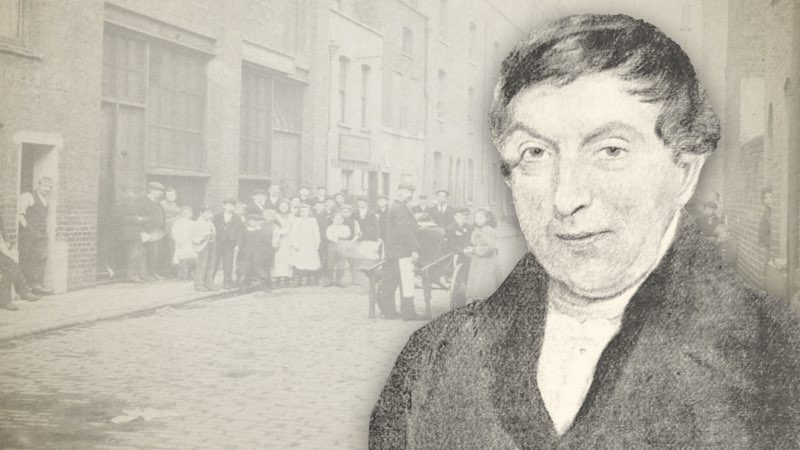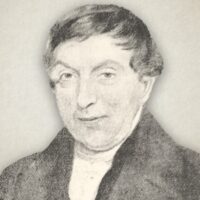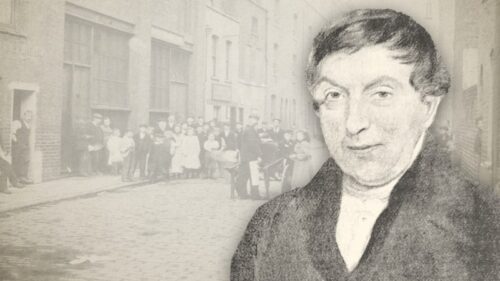
The Life And Death Of John Jones
Earthen Vessel 1868:
The Death Of Mr. John Andrews Jones, Of Jireh Chapel, East Road, City Road
While busily engaged in writing, a note came to hand which authorises us to announce that the patriarchal metropolitan Baptist minister—John Andrews Jones—has been removed from this world, where for more than eighty-eight years he was an inhabitant. The note referred to, says,—
“260, Oxford street, July 15th, 1868.
“Mr. C. W. Banks,—It is my painful duty to inform you of the death of Mr. J. A. Jones, which occured this morning at three o’clock. You will not be surprised, knowing he had been so long laid aside. Kindly insert some notice in the Vessel. I am, dear sir, yours truly,
“A. Clark.”
Thus the oldest head of a long-standing race of Gospel ministers has been laid in quietness and rest; and before another ten years have rolled away, many others will be called to follow those who through faith and patience now inherit the promises.
We can only say at the present that the aged man’s end was peaceful; and without any painful emotions either of a mental or physical kind, he bowed his head in death. Mr. Griffin, the successor in the pastorate to Mr. Jones, was with him on the Monday evening previously, when a kind look and a hearty shake of the hand, bespoke the continuance of every faculty, although even then death had nearly done his work. In this case we certainly are not called upon to sorrow as those who have no hope, because Mr. J. A. Jones was decidedly a firm believer in the New Covenant of grace, a bold and useful preacher of the Gospel of Christ, and an author of several works, whereby he earnestly contended for the faith once delivered unto the saints. Nearly thirty years have passed away since we first knew the deceased. Those thirty years have been most eventful in the Church’s history as regards the departure of those venerable sires whose ministrations helped much to perpetrate in London, and in other large cities, the glorious Gospel of the ever blessed God. A hasty glance over the last quarter of a century will shew the departure of many respecting whom we may say their places have never been filled up. We cannot but think of such godly men as Hawker, Cartwright, Doudney, Triggs, Tanner (of Exeter), Turner (of Sunderland), Chamberlain (of Leicester), Isaac Beeman (of Cranbrook), John Warburton (of Trowbridge), W. Gadsby (of Manchester), Joseph Irons (of Camberwell), John Stevens (of Meard’s-court), David Denham, James Nunn, Moody, John Pells, and hosts beside—men who lived and died in the faith, leaving behind them not a few whose souls were led to know the Lord through their instrumentality. Of Mr. J. A. Jones’s departure we may have further particulars presently.
The Funeral
On Tuesday afternoon, July 21st, 1868, the mortal remains of John Andrews Jones—the oldest Baptist minister in London—were conveyed to the tomb. At an early hour in the afternoon, the chapel in East Road, City Road, was opened, and, was soon filled persons who evidently were anxious to pay the last tribute of respect to an old minister and steward of God’s word. Shortly after three o’clock, it was evident by the deathly stillness that the funeral had arrived. The first who entered the chapel were the ministers, who walked with measured tread down the aisle: these were Mr. Samuel Milner, Mr. George Ward, Mr. John Hazelton, Mr. Joseph Wilkins, and Mr. Griffin. Mr. William Hawkins (son-in-law of deceased) was also present. The mourners having been conducted to their seats, the coffin was brought in, and placed in front of the pulpit, which was draped in black, as were the family pew and reading desk.
As soon as all arrangements had been completed, Mr. Griffin (successor to Mr. Jones), read a hymn, which being sung, Mr. Hazelton read the fifth chapter of St. Paul’s Second Epistle to the Corinthians: “For we know that if our earthly house of this tabernacle were dissolved, we have a building of God,” &c. Prayer followed. Mr. George Wyard, sen., then delivered an address, in the course of which he said they were assembled to pay respect to the remains of an old saint, and an old minister of the God. They were about to take the mortal part of their late beloved friend, and bury it. What was termed the jewel had gone, the casket only remaining. What was the exact condition of the departed soul they were unable to tell. St. John said, “It doth not yet appear what we shall be, but we know that when he shall appear we shall be like him, for we shall see him as he is.” That was all they knew. Referring to Mr. Jones, the speaker said he was much respected; and in traveling about the country lately he had been asked if John Andrews Jones was still alive. He had been asked that question the latter end of last week, and he had to reply in the negative. Many of the quaint saying of their departed friend would not soon be forgotten. Mr. Wyard concluded the service with prayer.
The funeral procession—which consisted of a hearse drawn by four horses, five mourning coaches, and some private carriages—proceeded to Abney Park Cemetery. In the immediate vicinity of Jireh Chapel some marks of respect were shown, many of the shops being partly closed, and many of the inhabitants were standing outside their doors, talking of the “old minister who preached for many years in Brick-lane.
Having arrived at the cemetery, the corpse was borne to the family grave, the ministers present acting as pall-bearers. A large number of friends also congregated here to bid adieu to the remains of the aged minister of the metropolis, amongst whom were Mr. William Flack, Mr. Samuel Jones, Mr. Evan Edwards, Mr. Symns, and Mr. Sack.
The ceremony at the grave was conducted by Mr. Samuel Milner, who in the course of his address said that it had been the wish of their departed friend to be buried in Bunhill Fields, and he had actually agreed with the sexton, and chosen the spot. But Bunhill Fields had closed, and the old sexton had long since died. And surely no man had merited more, if he (Mr. Milner) might use the term merit, to be buried in Bunhill Fields than he who had written the Memorials of that place. Their late departed friend used to call himself a Gillite. Some were ashamed of Gill, but he (the speaker) was not.. There were no Gills now. A more learned, good, and spiritual man than Gill never lived. He too was a Gillite. Referring to death, Mr. Milner said he had been thinking that the crysalis was a small of death. There was the caterpillar crawling from cabbage to cabbage. Let the caterpillar be put in a box. It appears to die; but after a time it comes forth a beautiful butterfly or moth. And so their departed friend was now removed from earth: his body was now crumbling and mingling with the earth, but his soul had flown. It was quite possible that some railway might cut through that ground a hundred years hence, but the dust in that grave was in safe keeping, and when the resurrection morn come, God would bring that body up out of the grace. It was a cause for thankfulness that many members of the family were the Lord’s people. They would meet their father again—not as their father, but as their brother in Christ, for there was but one Head in heaven—the Lord Jesus Christ. Yet he would be glad to see them, and they would be glad to see him. In conclusion, the speaker urged upon them to hold fast those truths which were so dear to their father, and not be ashamed of them for there is nothing to be ashamed of in the truth of God.
Mr. Wilkins, of Soho, closed the solemnities, by pronouncing the benediction.
The large number of persons—after taking the last look at the coffin which contained all that was mortal of John Andrews Jones—dispersed.
The funeral was conducted by Mr. Samuel Minton, of St. John Street Road.
John Andrews Jones (1779-1868) was a High-Calvinist Particular Baptist preacher and author. He served as pastor for the churches meeting at (1) Stonehouse, Devonshire; (2) Beccles, Suffolk; (3) North Road, Brentford; (4) Brick Lane, Old Street. He is best known for authoring ‘Bunhill Memorials’.
It should be noted, Jones stood on the side of those who denied the eternal Sonship of Christ. He affirmed:
“I not only maintain the essential Diety of the Father, but equally so of the Son, and Holy Spirit: equal in eternity; equally possessed of Divine attributes; bearing Divine and infinite names; entitled to, receiving, and that justly, Divine honours, adoration, and praise. One in nature as in essence: not existing one from another, such as the Son being in the Divine nature, begotten of the Father; and then the Holy Ghost proceeding (as God) from both.”
On the other side of the doctrine, Joseph Philpot affirmed:
“We are grieved to see an old error now brought forward and, we fear, spreading, which, however speciously covered up, is really nothing less than denying the Son of God. The error we mean is the denial of the eternal Sonship of the Lord Jesus Christ, as the Only-begotten of the Father before the foundation of the world…The fundamental doctrine of the Trinity [cannot] be maintained except by holding the eternal Sonship of Christ. There are two errors of an opposite nature as regards the doctrine of the Trinity:
1. One is Tritheism, or setting up three distinct Gods; the other,
2. Sabellianism, which holds that there is but one God under three different names. Each of these errors destroys the Trinity in Unity, the first by denying the Unity of the Essence, the second by denying the Trinity of the Persons.
There are four leading ways in which erroneous men have, at different periods of the church’s history, sought to nullify the vital doctrine of the eternal Sonship of Jesus:—
1. Some place the Sonship of Christ in His incarnation, as if He was not the Son of God before He assumed our nature in the womb of the Virgin.
2. Another error on this important point is that the Lord Jesus is the Son of God by the resurrection from the dead.
3. Another erroneous view of the Sonship of Christ is that He is so by virtue of His exaltation to the right hand of God.
4. But there is another way in which erroneous men seek to explain, and by explaining deny, the eternal Sonship of the Lord Jesus, and that is, by asserting that He is a Son by office.
These points, then, we consider to have been already fully established by us from the Word of truth:
1, that Jesus is the Son of God;
2, that He is not the Son of God by the assumption of human nature, or by the resurrection, or by sitting at God’s right hand, or by virtue of any covenant name, title, or office;
3, that He was the Son of God before He came into the world; and
4, that consequently He is the Son of God in His divine nature.
[These erroneous teachers] censure the Arminians for saying that they cannot receive election because it contradicts their first notions, their primary, fundamental principles, both of the justice and love of God; and yet [they], on precisely similar grounds, reject the eternal Sonship of Christ, as contradicting [their] natural views of priority and posteriority. So the Jews rejected and crucified the Lord of life and glory, because His appearance in the flesh as a poor carpenter’s son contradicted all their pre-conceived opinions of the dignity and glory of the promised Messiah; and in a similar way infidels reject miracles as contrary to their fundamental opinions of the laws of nature being unalterable. Thus to reject the eternal Sonship of the blessed Lord merely because it contradicts some of [their] preconceived opinions is most dangerous ground to take, and is to set up [their] authority against that of the Word of truth.”




